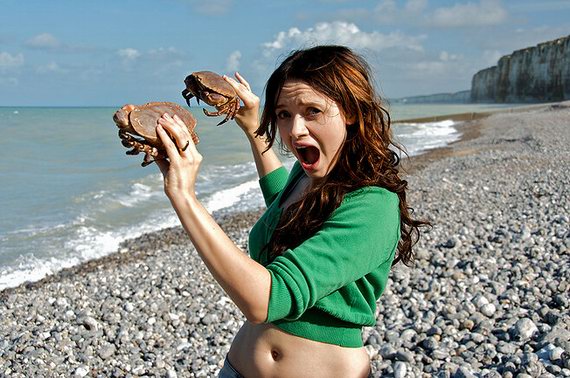The Politics of Passion, by David Bax
If Michel Leclerc’s new film, The Names of Love, were to be described to you as a film about the ways in which a person’s upbringing comingles with her or his present in order to develop a worldview or the ways in which class, age and gender can contribute to very different points of view, even within the same area of the political spectrum, that description would technically be correct. But it doesn’t exactly make the film sound like a funny, sexy romp and that’s just what it actually is.
For a film that explores the push and pull between different denizens of the political left, a surprisingly large portion of the running time involves naked breasts, not to mention a good amount of dark, wicked humor. The story concerns a man named Arthur Martin (Jacques Gamblin), who is reserved, quiet and somewhat shy but adamant in his socialist principles. In the film’s most traditional romcom element, he meets cute with Bahia (Sara Forestier), a young French-Algerian woman who seems to view clothing as a necessary evil and really, really dislikes fascists, defined by her as pretty much anyone who disagrees with her, wears a suit and/or is white.
Bahia’s modus operandi is sleeping with her political enemies and using her sexual powers to change their minds. When she meets Arthur, a buttoned-down type who works for a government agency, she assumes she’s found another target. What follows is a romance that builds gradually but eventually becomes powerful enough to sweep you along in its current. While far too many romantic comedies just assume that having its leads spend enough screen time together is reason enough for them to end up with each other, The Names of Love earnestly and voraciously explores that the right mix of similarities and difference can create an irresistible attraction. Arthur and Bahia amuse each other just enough, challenge each other just enough and complement each other just enough that their relationship will be undeniably relatable to anyone who has ever been in love.
Also distinguishing this film from other of its genre is the comedy part of the romantic comedy equation. It mines jokes from some very difficult places but never aims only to shock. These laughs are well earned even when they sprout from subject matter such as the Holocaust and child molestation. These things work as humor because they are also treated honestly and maturely. The lasting effects that sexual abuse has on a child and on the adult that child becomes are not glossed over but are recognized substantially enough to express the tragedy of the character. Things never get maudlin, though, because Leclerc has a surprisingly humanistic worldview for someone so coldly satirical. The Names of Love brims with verve and life in every scene. Alongside this biting comedy are moments of very funny sweetness, such as when Bahia’s hippie-ish dad and Arthur’s very conservative father bond over the fixing of a coffee maker that was intentionally broken for that purpose.
Such a delicate balance between optimism and pitch black humor is achievable because Leclerc clearly takes political issues very seriously without getting emotionally overwhelmed by them. He does not approach these issues academically but rather is very aware of the effects they have on real life people. At the same time, he never gets too bogged down in the human aspects of racism and religious tolerance and so forth and therefore the movie never ventures into treacly “can’t we all just get along” territory. This equilibrium in the director’s approach is also apparent in the romance between the two leads. He, who earns his living examining dead animals for signs of disease, is analytical in his approach, considering the good of the people at large while remaining at a distance from nearly every individual he meets. She is impulsive and passionate, uninterested in parsing the degrees of difference and nuance among the opposition, only seeing them as enemies to be conquered for the good of the poor and the minorities.
Perhaps the most important element Leclerc plays with here is the one mentioned in the title. The “names” of love refer specifically here to the names of the characters. We don’t get to choose what our surname will be, nor do we get to choose what that name represents, either to our family or to the world around us, who will no doubt make assumptions based on it. But we do have a responsibility, as humans and citizens, to do with that name what we can and perhaps change perceptions. The Names of Love is a lovely, funny and exhilarating film that, while never turning away from the evil of mankind – both grand and mundane – is ultimately hopeful.































I don’t know what it says about me that the image up top is enough to get me to watch this film, but it is.